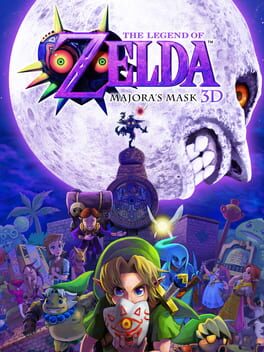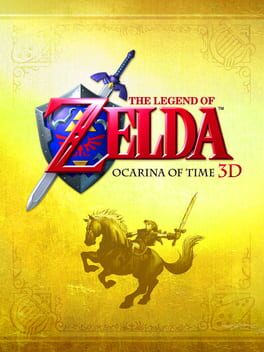Millionull
Recent Activity
19 hrs ago
2 days ago
Millionull
completed
Star of Providence
3 days ago
Millionull is
now playing
Killer7
3 days ago
Millionull
completed
Lisa: The First
4 days ago
Millionull is
now playing
Lisa: The First
4 days ago
Millionull wants
Birdcage
4 days ago
Millionull
completed
The Legend of Zelda: Majora's Mask 3D
Unlike Ocarina of Time I did actually play this one (N64 version) as a kid, so my thoughts will be tinted by a nostalgic lens. I bring this up because for as much as I may tend to favor this game over OoT, I think it’s important that this duology be read as a larger singular narrative; meaning as two pieces of art in communication with one another.
Regardless of how you choose to interpret the events of the story, there is this pervasive atmosphere of grief throughout the entirety of Majora’s Mask. While this might often overlap with what can be defined as “darkness” – horror elements, discussion of death, characters dying on screen, etc – returning to this game as an adult※ I find myself much more aware of the quiet sadnesses that sit right around the edges of the story’s periphery.
I think it’s a common sentiment to feel anxious or frustrated with the in-game time limit set on everything. Compared to the open fields of Hyrule, everything in Termina is needled by a sense of constraint. Just exploring the world can feel nerve wracking when in your peripheral vision lies a constant reminder that your time there is limited. “Limited time” might not be the exact right term here, because you do have an unlimited number of resets to make things right, rather what is actually limited is your sense of attachment or comfort with the world of Termina.
In my revisit to this game I found myself made less anxious by the short-term time limit. In fact, I think it’s a beneficial element: it forces you to be conscious in a number of ways of how you spend it. Needing to reset in the middle of a dungeon is ultimately not very punishing because you come back armed with the knowledge (or loot) to get through it much faster. Instead, what really bred a sense of frustration in me was how with each necessary reset you lose all of what I can only loosely define as "emotional progress."
Ocarina of Time in terms of both narrative and gameplay encourages you to have courage, to conquer what scares you for once and for all. Majora's Mask expands on that theme by attaching the unfortunate truth that greater horrors of existence can only be beaten back, never vanquished. For as much progress as you can make, the absolution of death, a reset to zero is ever present.
It’s frustrating in that you can save everyone, but you actually can’t save everyone. All the characters you help out through your actions lose all memory of you after each reset. After which you pass them by still struggling with that once-solved dilemma, knowing you could help them again but it would take too much time away from your current task. Of course, this isn’t just limited to individual goodwill; any secrets you uncover, any memorable moments you witness, any new records you set in minigames, all wiped clean with the reset of the clock. Nothing is ever permanent. There will always be something you lose. And this really comprises the heart of the grief that Majora’s Mask deals with.
Relatedly and in stark contrast to Ocarina of Time, there is not much of a heroic narrative here. While Link’s status as fate-chosen hero remains, his role in saving Termina is not part of some grand “chosen one” narrative predestined for him by the goddesses, instead it seems almost circumstantial that he ends up in Termina in the first place. While Link never receives any particularly special treatment from most NPCs across games (he’s just another traveler, customer, etc), here his presence is particularly anonymised underneath the variety of masks he wears – literally. Most notably, many of his heroisms are attributed by others to completely different characters he has assumed the role of, eg. Darmani III and Mikau. I find this particularly interesting compared to the more generic masked roles Link can assume because it suggests a complete subsuming of Link(/the player)’s individualized identity into another character role.
For as different as the individualities behind each mask can be, they are also at the same time – to a certain degree – interchangeable, able to be assumed by others. From a nihilistic viewpoint this means that nothing is important – no value is inherent in either the mask or the mask’s origin point because it is both replaceable and subject to the whims of time. Anyone else besides the legendary hero of Hyrule could wear those masks and do his job just as well. But at the same time, this also makes the masks incredibly important because their roles can be assumed by anyone, we can all be unified in these forms of expression through some undetectable thread, some reflex of the collective unconscious that compels us to express ourselves in the first place.
And that is ultimately what Majora’s Mask asks of you; to see yourself in others. To hollow out of yourself and scatter your shell behind you as many times as you need because everything changes, including yourself. To understand that your grief is not uniquely individual, that it will not magically disappear one day but can heal into something different, more than courage – resilience. Love.
※For as developed as my frontal lobe may be, I’m still pretty young relatively speaking, and my life has much more room for grief than what I hold now. I wonder how I'll feel about this game in 5-10 years?
Regardless of how you choose to interpret the events of the story, there is this pervasive atmosphere of grief throughout the entirety of Majora’s Mask. While this might often overlap with what can be defined as “darkness” – horror elements, discussion of death, characters dying on screen, etc – returning to this game as an adult※ I find myself much more aware of the quiet sadnesses that sit right around the edges of the story’s periphery.
I think it’s a common sentiment to feel anxious or frustrated with the in-game time limit set on everything. Compared to the open fields of Hyrule, everything in Termina is needled by a sense of constraint. Just exploring the world can feel nerve wracking when in your peripheral vision lies a constant reminder that your time there is limited. “Limited time” might not be the exact right term here, because you do have an unlimited number of resets to make things right, rather what is actually limited is your sense of attachment or comfort with the world of Termina.
In my revisit to this game I found myself made less anxious by the short-term time limit. In fact, I think it’s a beneficial element: it forces you to be conscious in a number of ways of how you spend it. Needing to reset in the middle of a dungeon is ultimately not very punishing because you come back armed with the knowledge (or loot) to get through it much faster. Instead, what really bred a sense of frustration in me was how with each necessary reset you lose all of what I can only loosely define as "emotional progress."
Ocarina of Time in terms of both narrative and gameplay encourages you to have courage, to conquer what scares you for once and for all. Majora's Mask expands on that theme by attaching the unfortunate truth that greater horrors of existence can only be beaten back, never vanquished. For as much progress as you can make, the absolution of death, a reset to zero is ever present.
It’s frustrating in that you can save everyone, but you actually can’t save everyone. All the characters you help out through your actions lose all memory of you after each reset. After which you pass them by still struggling with that once-solved dilemma, knowing you could help them again but it would take too much time away from your current task. Of course, this isn’t just limited to individual goodwill; any secrets you uncover, any memorable moments you witness, any new records you set in minigames, all wiped clean with the reset of the clock. Nothing is ever permanent. There will always be something you lose. And this really comprises the heart of the grief that Majora’s Mask deals with.
Relatedly and in stark contrast to Ocarina of Time, there is not much of a heroic narrative here. While Link’s status as fate-chosen hero remains, his role in saving Termina is not part of some grand “chosen one” narrative predestined for him by the goddesses, instead it seems almost circumstantial that he ends up in Termina in the first place. While Link never receives any particularly special treatment from most NPCs across games (he’s just another traveler, customer, etc), here his presence is particularly anonymised underneath the variety of masks he wears – literally. Most notably, many of his heroisms are attributed by others to completely different characters he has assumed the role of, eg. Darmani III and Mikau. I find this particularly interesting compared to the more generic masked roles Link can assume because it suggests a complete subsuming of Link(/the player)’s individualized identity into another character role.
For as different as the individualities behind each mask can be, they are also at the same time – to a certain degree – interchangeable, able to be assumed by others. From a nihilistic viewpoint this means that nothing is important – no value is inherent in either the mask or the mask’s origin point because it is both replaceable and subject to the whims of time. Anyone else besides the legendary hero of Hyrule could wear those masks and do his job just as well. But at the same time, this also makes the masks incredibly important because their roles can be assumed by anyone, we can all be unified in these forms of expression through some undetectable thread, some reflex of the collective unconscious that compels us to express ourselves in the first place.
And that is ultimately what Majora’s Mask asks of you; to see yourself in others. To hollow out of yourself and scatter your shell behind you as many times as you need because everything changes, including yourself. To understand that your grief is not uniquely individual, that it will not magically disappear one day but can heal into something different, more than courage – resilience. Love.
※For as developed as my frontal lobe may be, I’m still pretty young relatively speaking, and my life has much more room for grief than what I hold now. I wonder how I'll feel about this game in 5-10 years?
4 days ago
4 days ago
Millionull
completed
Bust-a-Move DS
9 days ago
Millionull is
now playing
The Legend of Zelda: Majora's Mask 3D
9 days ago
Millionull
completed
The Legend of Zelda: Ocarina of Time 3D
Playing through this game with zero nostalgic value attached I feel like, respectfully, it's overrated. Yes, Ocarina of Time is a game that does many things very well and is crucially important in the history of the medium as a whole. But is it "the greatest game ever made" for all 26 years since its release? uhh...
9 days ago
9 days ago
Millionull is
now playing
Rhythm Thief & the Emperor's Treasure
9 days ago
Millionull
completed
HarmoKnight
9 days ago

